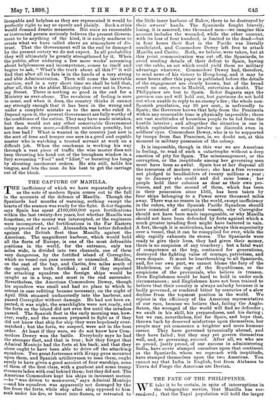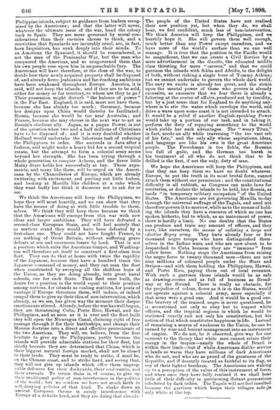THE FATE OF THE PHILIPPINES.
WE take it to be certain, in spite of interruptions in the telegraphic service, that Manilla has sur- rendered; that the Tagal population will hold the larger Philippine islands, subject to guidance from leaders recog- nised by the Americans ; and that the latter will never, whatever the ultimate issue of the war, hand the colony back to Spain. They are more governed by moral con- siderations than their enemies choose to think, and a conviction that Spaniards are incurably cruel, are, in fact, born Inquisitors, has sunk deeply into their minds. To an American the Spaniard, it should be remembered, is not the man of the Peninsular War, but the man who conquered the Americas, and so misgoverned them that his own people rose upon him in unquenchable fury. The Americans will have therefore, at the close of the war, to decide how their newly acquired property shall be disposed of, and already fierce jealousies and far-reaching ambitions have been awakened throughout Europe. America, it is said, will not keep the islands ; and if they are to be sold, either for money or for territory, to whom are they to go ? Their possession might disturb "the balance of power" in the Far East. England, it is said, must not have them, because she has already too much ; Germany, because her designs upon China would thereby be facilitated ; Russia, because she would be too near Australia ; and France, because she may choose in the next war to act as Russia's obedient ally. Japan, as a pagan Power, is out of the question when two and a half millions of Christians have to be disposed of ; and it is very doubtful whether Holland would undertake the laborious task of reducing the Philippines to order. She succeeds in Java after a fashion, and might make a heavy bid for a second tropical estate, but the attempt to form a colonial army seems beyond her strength. She has been trying through a whole generation to conquer Acheen, and the fierce little Malay State holds her successfully at bay. These argu- ments, and many like them, will be urged on the Ameri- cans by the Chancelleries of Europe, which are already twittering with excitement, and putting out little feelers, and looking at Manilla like children at a cake which they want badly but think it decorous not to ask for or see.
• We think the Americans will keep the Philippines, we hope they will most heartily, and we can show that they have the means of doing so with little trouble to them- selves. We think they will keep them because we think that the Americans will emerge from this war with new ideas and larger ambitions. They will have defeated a second-class European State, and will feel acutely that as matters stand they would have been defeated by a first-class one. They could not have fought France, to say nothing of Great Britain, without suffering grave defeats at sea and enormous losses by land. That is not a position which suits the American temper, and Washing- ton will therefore set itself to construct a first-class iron fleet. They can do that at home with twice the rapidity of the Japanese, because they have a hundred times the Japanese command of money, and they can man the fleet when constructed by sweeping all the shiftless boys of the Union, as they are doing already, into great naval schools, one for each State. That fleet once built, the desire for a position in the world equal to their position among nations, for islands as coaling stations, for posts of vantage if Europe threatens them, will induce, or indeed compel them to give up their idea of non-intervention, which already, as we see, has given way the moment their deeper emotions are stirred. Already, before the war has well begun, they are threatening Cuba, Porto Rico, Hawaii, and the Philippines, and as soon as it is over and the fleet built they will open the Nicaragua Canal, claiming right of free passage through it for their battleships, and change their Monroe doctrine into a direct and effective protectorate of the two Americas. They will, we believe, from the first hesitate to give up the Philippines, partly because the islands will provide admirable stations for their fleet, but chiefly because they are determined that China, which is their biggest natural foreign market, shall not be closed to their trade. They must be ready to strike, if need be, on the Chinese coast, and to strike bard, and seeing that, they will not give up islands which offer them impreg- nable defences for their dockyards, their coal-vaults, and their arsenals. To retain them is, of course, to give up their traditional policy of non-interference in the polities of the world ; but we confess we have not much feith in self-denying policies of that kind. To shake down an aacient. European throne is surely interference with Europe of a definite kind, and they are doing that already. The people of the 'United States have not realised their new position yet, but when they do, we shall hear, we feel confident, much less of non-intervention. We think America will keep the Philippines, and we heartily hope it. She will govern them well enough. much better than any Power except ourselves, and we have more of the world's surface than we can well manage. It is true that the position in the Pacific would be magnificent, that we can create a Civil Service by a mere advertisement in the Gazette, the educated middle class thirsting for more "careers," and that we could garrison the islands with Sikhs and Afridis, to the delight of both, without risking a single bone of Tommy Atkins; but we cannot undertake to govern the whole dark world. The envy we excite is already too great, and the strain upon the mental power of those who govern is already excessive, so excessive that we fear there is already a faltering at the centre of affairs, produced not by timidity, but by a just sense that for England to do anything any- where is to stir the water which envelops the world, and drive a wave upon some coast it is not intended to attack. It would be a relief if another English-speaking Power would take up a portion of our task, and in taking it, perform the duty of repaying something to the world which yields her such advantages. The "weary Titan," in fact, needs an ally while traversing "the too vast orb of his fate," and the only ally whose aspirations, ideas, and language are like his own is the great American people. The Frenchman is too fickle, the Russian too full of guile, and the German too harsh in his treatment of all who do not think that to be drilled is the first, if not the only, duty of man.
We hope the Americans will keep the Philippines, and that they can keep them we have no doubt whatever. Europe, to put the truth in its most brutal form, cannot attack them without our permission ; and the constitutional difficulty is all rubbish, as Congress can make laws for territories, or declare the islands to be held, like Bosnia, as lands "in temporary military occupation" of the -United States. The Americans are not governing Manilla to-day through the universal suffrage of the Tagals, and need not therefore govern it to-morrow, while as to the means of hold- ing the islands they have a resource of which no one has spoken hitherto, but to which, as an instrument of power, there is hardly a limit. No one doubts that the States can produce and train any amount of officers, and they have, like ourselves, the means of enlisting a large and effective Sepoy army. They have already four or five thousand negro troops who have distinguished them- selves in the Indian wars, and who are now about to be despatched to Cuba because they are " immune " from yellow fever. Nothing stops the Americans from raising the negro force to twenty thousand men—there are now nine millions of coloured people under the Stars and Stripes—and with them holding the Philippines, Hawaii, and Porto Rico, paying them out of local revenues. With such a garrison those islands would be as safe as drawing-rooms and as full of business as Broad- way or the Strand. There is really no obstacle, for the prejudice of colour, fierce as it is in the States, would not operate against a colonial army, more especially if that army were a good one. And it would be a good one. The bravery of the trained negro is never questioned, he is accustomed not only to obey but to respect white officers, and the tropical regions in which he would be stationed exactly suit not only his constitution, but his notion of that which constitutes happiness in life. Instead of remaining a source of weakness to the Union, he can be turned by wise and lenient management into an instrument of empire. We do not, be it observed, give way for one moment to the theory that white men cannot retain their energy in the tropics—nearly the whole of Brazil .is within their limit—but if white Americans dislike service in lands so warm they have millions of dark Americans who do not, and who are as proud of the greatness of the Republic, and if decently treated as faithful to its flag, as any of their lighter brethren. The Americans are waking up to a perception of the value of this instrument of force, and when once they have fully realised it we shall hear little of their difficulty in garrisoning distant possessions inhabited by dark tribes. The Tagals will not feel insulted because the garrison which keeps their villages safe 118 only white at the top.







































 Previous page
Previous page